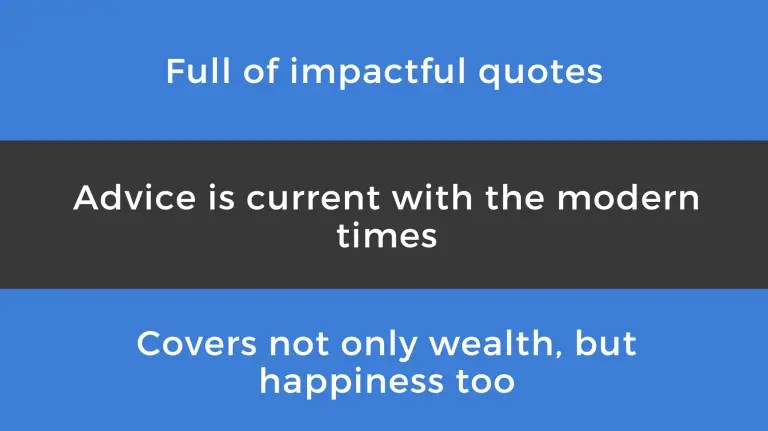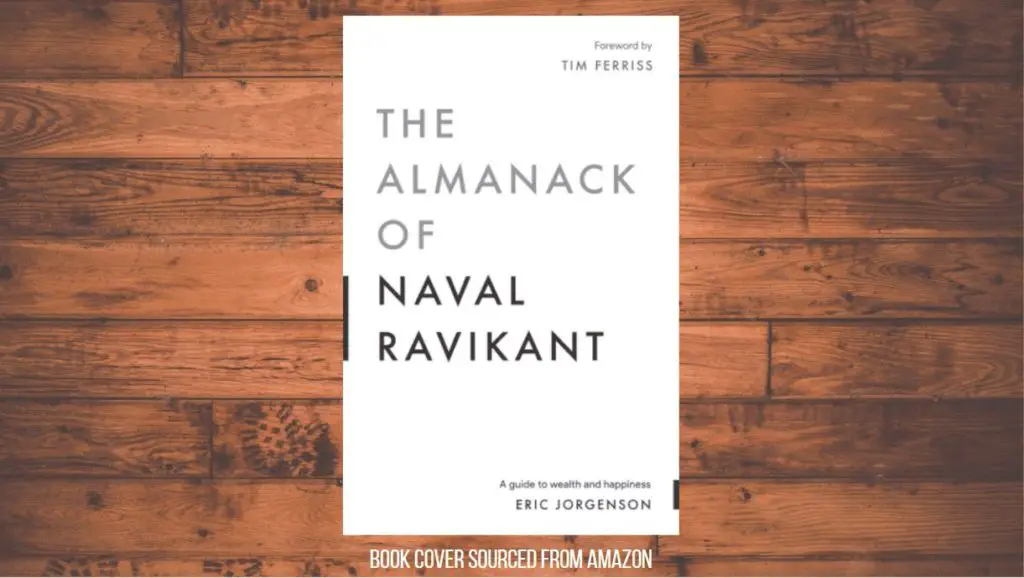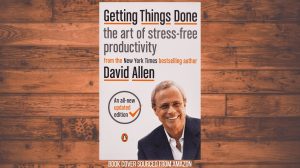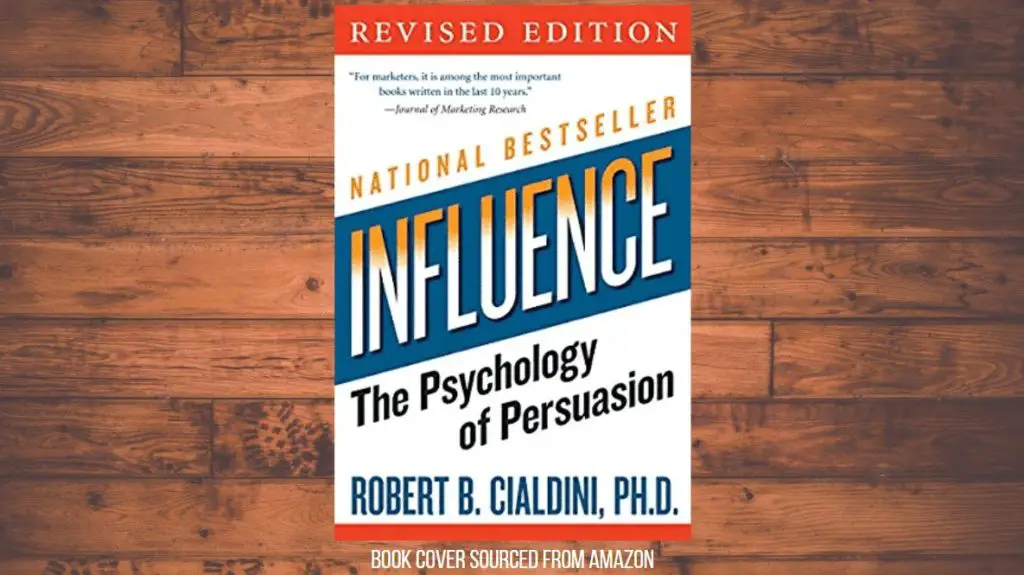This post may contain affiliate links, which means I’ll receive a commission if you purchase through my links, at no extra cost to you. Please read full disclosure for more information.
ABOUT
- Title: The Almanack of Naval Ravikant
- Sub-title: A Guide to Wealth and Happiness
- Author: Eric Jorgenson
- About the author: Eric Jorgenson is a writer with interests in startup growth and Angel investing. He helped found Zaarly, which has been publishing online since 2014. Eric also has a business blog (Evergreen) that has been visited by over one million readers.
- Pages: 244
- Published: 2020
- Link to book
HIGH-LEVEL SUMMARY
Naval Ravikant is an entrepreneur, philosopher, investor, and an icon in the Silicon Valley/startup world. He has not only achieved great success financially, but he has also achieved and maintained happiness.
Author Eric Jorgenson says he created this book “as a public service.” The book collects the wisdom from Naval over the past decade or so that was shared through blog posts, tweets, and podcasts. Eric curated all this content into one digestible reading that can provide “the benefits of a lifetime in a few hours.”
The two overarching topics covered are wealth and happiness.
Under that umbrella, specific topics covered include:
- Understanding how wealth is created
- Finding and building “specific knowledge”
- Finding a position of leverage
- Getting paid for your judgement
- Prioritization and focus
- How to think clearly
- Learning the skills of decision-making
- How happiness is learned and is a choice
- Happiness requiring presence and peace
- The impact of desire and envy on happiness
- How happiness is built by habits
Overall, this book picks the brain of Naval Ravikant and delivers actionable advice.
RECOMMENDATION
The Almanack of Naval Ravikant is easy to read through, yet packs a bunch of helpful and thought-provoking content. I would recommend this to anyone looking to improve their life, especially if you are looking to improve your wealth and happiness.
The author gives you a peek into Naval’s thought processes, which can help you rework yours. The book is filled with actionable steps you can take to begin making improvements.
TOP 35 TAKEAWAYS
In no particular order
1. If you have nothing in your life, but you have at least one person that loves you unconditionally, it’ll do wonders for your self-esteem.
2. Books make for great friends, because the best thinkers of the last few thousand years tell you their nuggets of wisdom.
3. You’re not going to get rich renting out your time. You must own equity—a piece of a business—to gain your financial freedom. You will get rich by giving society what it wants but does not yet know how to get. At scale.
4. The internet has massively broadened the possible space of careers. Most people haven’t figured this out yet.
5. Learn to sell. Learn to build. If you can do both, you will be unstoppable.
6. Arm yourself with specific knowledge, accountability, and leverage. Specific knowledge is knowledge you cannot be trained for. If society can train you, it can train someone else and replace you.
7. Code and media are permissionless leverage. They’re the leverage behind the newly rich. You can create software and media that works for you while you sleep. An army of robots is freely available—it’s just packed in data centers for heat and space efficiency. Use it. If you can’t code, write books and blogs, record videos and podcasts. Leverage is a force multiplier for your judgment. Fortunes require leverage.
8. Reading is faster than listening. Doing is faster than watching.
9. The most important skill for getting rich is becoming a perpetual learner. You have to know how to learn anything you want to learn. It’s much more important today to be able to become an expert in a brand-new field in nine to twelve months than to have studied the “right” thing a long time ago.
10. Foundations are key. It’s much better to be at 9/10 or 10/10 on foundations than to try and get super deep into things. Basic arithmetic and numeracy are way more important in life than doing calculus. Similarly, being able to convey yourself simply using ordinary English words is far more important than being able to write poetry, having an extensive vocabulary, or speaking seven different foreign languages.
11. A leveraged worker can out-produce a non-leveraged worker by a factor of one thousand or ten thousand. What you want in life is to be in control of your time. You want to get into a leveraged job where you control your own time and you’re tracked on the outputs.
12. Earn with your mind, not your time. You start as a salaried employee. But you want to work your way up to try and get higher leverage, more accountability, and specific knowledge. Get paid for your judgement. CEOs are highly paid because of their leverage. Small differences in judgment and capability really get amplified.
13. Value your time at an hourly rate, and ruthlessly spend to save time at that rate. Another way of thinking about something is, if you can outsource something or not do something for less than your hourly rate, outsource it or don’t do it. Set a very high hourly aspirational rate for yourself and stick to it.
14. What is the most important thing to do for younger people starting out? Spend more time making the big decisions. There are basically three really big decisions you make in your early life: where you live, who you’re with, and what you do.
15. What are one or two steps you’d take to surround yourself with successful people? Figure out what you’re good at, and start helping other people with it. Give it away. Pay it forward.
16. Money is not the root of all evil; there’s nothing evil about it. But the lust for money is bad. You make money to solve your money and material problems. I think the best way to stay away from this constant love of money is to not upgrade your lifestyle as you make money.
17. If you’re not getting promoted through the ranks, it gets a lot harder to catch up later in life. It’s good to be in a smaller company early because there’s less of an infrastructure to prevent early promotion. For someone who is early in their career (and maybe even later), the single most important thing about a company is the alumni network you’re going to build.
18. One of the things I think is important to make money is having a reputation that makes people do deals through you. If you are a trusted, reliable, high-integrity, long-term-thinking dealmaker, when other people want to do deals but don’t know how to do them in a trustworthy manner with strangers, they will literally approach you and give you a cut of the deal just because of the integrity and reputation you’ve built up.
19. My co-founder Nivi said, “In a long-term game, it seems that everybody is making each other rich. And in a short-term game, it seems like everybody is making themselves rich.”
20. Your real résumé is just a catalog of all your suffering. If I ask you to describe your real life to yourself, and you look back from your deathbed at the interesting things you’ve done, it’s all going to be around the sacrifices you made, the hard things you did.
21. The really smart thinkers are clear thinkers. They understand the basics at a very, very fundamental level.
22. The number one thing clouding us from being able to see reality is we have preconceived notions of the way it should be. To see the truth, you have to get your ego out of the way because your ego doesn’t want to face the truth. The smaller you can make your ego, the less conditioned you can make your reactions, the less desires you can have about the outcome you want, the easier it will be to see the reality.
23. It’s actually really important to have empty space. If you don’t have a day or two every week in your calendar where you’re not always in meetings, and you’re not always busy, then you’re not going to be able to think. I also encourage taking at least one day a week (preferably two, because if you budget two, you’ll end up with one) where you just have time to think.
24. Learn the skills of decision-making. Decision-making is everything. In fact, someone who makes decisions right 80 percent of the time instead of 70 percent of the time will be valued and compensated in the market hundreds of times more. If you can be more right and more rational, you’re going to get nonlinear returns in your life.
25. Simple heuristic: If you’re evenly split on a difficult decision, take the path more painful in the short term. If you have two choices to make, and they’re relatively equal choices, take the path more difficult and more painful in the short term.
26. Reading science, math, and philosophy one hour per day will likely put you at the upper echelon of human success within seven years. The genuine love for reading itself, when cultivated, is a superpower. The means of learning are abundant—it’s the desire to learn that is scarce.
27. The three big ones in life are wealth, health, and happiness. We pursue them in that order, but their importance is reverse.
28. Happiness is the state when nothing is missing. To me, happiness is not about positive thoughts. It’s not about negative thoughts. It’s about the absence of desire, especially the absence of desire for external things. A happy person isn’t someone who’s happy all the time. It’s someone who effortlessly interprets events in such a way that they don’t lose their innate peace.
29. When working, surround yourself with people more successful than you. When playing, surround yourself with people happier than you.
30. Most fit and healthy people focus much more on what they eat than how much. Quality control is easier than (and leads to) quantity control. When it comes to medicine and nutrition, subtract before you add.
31. Doctors won’t make you healthy. Nutritionists won’t make you slim. Teachers won’t make you smart. Gurus won’t make you calm. Mentors won’t make you rich. Trainers won’t make you fit. Ultimately, you have to take responsibility. Save yourself.
32. What habit would you say most positively impacts your life? The daily morning workout. That has been a complete game-changer. It’s made me feel healthier, younger.
33. Cold showers: Now, I turn the shower on full-blast, and then I walk right in. I don’t give myself any time to hesitate. As soon as I hear the voice in my head telling me how cold it’s going to be, I know I have to walk in. I learned a very important lesson from this: most of our suffering comes from avoidance. Most of the suffering from a cold shower is the tip-toeing your way in. Your body saying it’s cold is different than your mind saying it’s cold.
34. Time spent undistracted and alone, in self-examination, journaling, meditation, resolves the unresolved and takes us from mentally fat to fit.
35. In 1,000 parallel universes, you want to be wealthy in 999 of them. You don’t want to be wealthy in the fifty of them where you got lucky, so we want to factor luck out of it.
WHAT I LIKED

Full of impactful quotes
The Almanack of Naval Ravikant is filled with impactful quotes. They can be deep, eye-opening, brutally honest, and entertaining. You’ll want to take these quotes and stick them onto your wall. A few examples include:
- Making money is not a thing you do—it’s a skill you learn.
- Learn to sell. Learn to build. If you can do both, you will be unstoppable.
- 99% of effort is wasted.
- Forget rich versus poor, white-collar versus blue. It’s now leveraged versus un-leveraged.
Advice is current with the modern times
I enjoyed how Naval’s advice catered to modern times. For example, Naval acknowledges how media and code now provide a form of leverage to anyone who takes advantage of them.
Through media, someone can reach millions of people around the world. Think about how YouTubers can create something one time from their room and reach an entire audience while making money.
He also talks about the importance of being able to learn things extremely quickly. Naval points out that the world is moving fast and those who don’t develop the skill to learn quickly and adapt will be left behind.
Covers not only wealth, but happiness too
You find a lot of books on wealth and a lot of books on happiness, but it’s rare to find a book that covers both.
The first part of The Almanack of Naval Ravikant covers a variety of topics related to wealth building. The second half of the book covers happiness and makes for a great full-circle read.
Reading about happiness after reading about wealth helps remind the reader of what’s ultimately important. It’s not about pursuing money for the sake of accumulating money. It’s about having freedom and security so you can have happiness and peace.
BENEFITS TO YOUR LIFE AND CAREER
Gain clarity on the important drivers of wealth and happiness
Naval points out the important drivers of wealth and happiness. For example, drivers of wealth include:
- Creating something society wants/needs but doesn’t yet know they want
- Using leverage from capital, labor, media, and/or code
- Finding and building specific knowledge in a certain area
- Building or buying equity in a buisness.
For happiness, drivers include:
- Building positive habits for happiness
- Removing desire and envy
- Be present
- Shifting your mindset to understand happiness is a choice
Learn how important leverage is
In the wealth section of the book, leverage is frequently brought up. Naval talks about how leverage is key to building wealth and there are more forms of leverage today than there ever has been.
With leverage, you can amplify your output by hundreds or thousands. Once you read this book, you are going to want to find ways to gain leverage and use it to your advantage.
17 ACTIONS YOU SHOULD TAKE
1. Seek wealth, not money or status. Wealth is having assets that earn while you sleep. Money is how we transfer time and wealth. Status is your place in the social hierarchy. Ignore people playing status games. They gain status by attacking people playing wealth creation games.
2. Pick business partners with high intelligence, energy, and, above all, integrity. Don’t partner with cynics and pessimists. Their beliefs are self-fulfilling.
3. If you can’t code, write books and blogs, record videos and podcasts.
4. Study microeconomics, game theory, psychology, persuasion, ethics, mathematics, and computers.
5. Work as hard as you can. Even though who you work with and what you work on are more important than how hard you work.
6. Apply specific knowledge, with leverage, and eventually you will get what you deserve.
7. Focus on the foundations, fundamentals, and basics of everything you learn and do.
8. Think about what product or service society wants but does not yet know how to get. You want to become the person who delivers it and delivers it at scale.
9. If you want to make the maximum amount of money possible, if you want to get rich over your life in a deterministically predictable way, stay on the bleeding edge of trends and study technology, design, and art—become really good at something. [1]
10. It’s actually really important to have empty space. If you don’t have a day or two every week in your calendar where you’re not always in meetings, and you’re not always busy, then you’re not going to be able to think. I also encourage taking at least one day a week (preferably two, because if you budget two, you’ll end up with one) where you just have time to think.
11. If you have two choices to make, and they’re relatively equal choices, take the path more difficult and more painful in the short term.
12. Learn to Love to Read. The genuine love for reading itself, when cultivated, is a superpower.
13. How does someone build the skill of happiness? You can build good habits. Not drinking alcohol will keep your mood more stable. Not eating sugar will keep your mood more stable. Not going on Facebook, Snapchat, or Twitter will keep your mood more stable.
14. Caught in a funk? Use meditation, music, and exercise to reset your mood.
15. What habit would you say most positively impacts your life? The daily morning workout. That has been a complete game-changer. It’s made me feel healthier, younger.
16. Do you have a current meditation practice? The one I found works best for me is called Choiceless Awareness, or Nonjudgmental Awareness. You could also do transcendental meditation, which is where you’re using repetitive chanting to create a white noise in your head to bury your thoughts. Or, you can just very keenly and very alertly be aware of your thoughts as they happen.
17. Life-hack: When in bed, meditate. Either you will have a deep meditation or fall asleep. Victory either way.
RESOURCES
The Almanack of Naval Ravikant can be found on Amazon at this link here if you are interested in reading.



